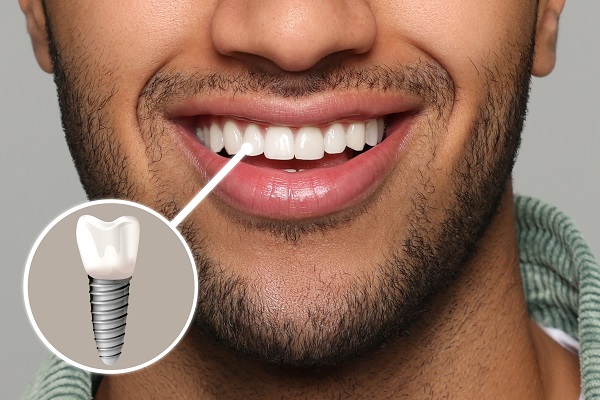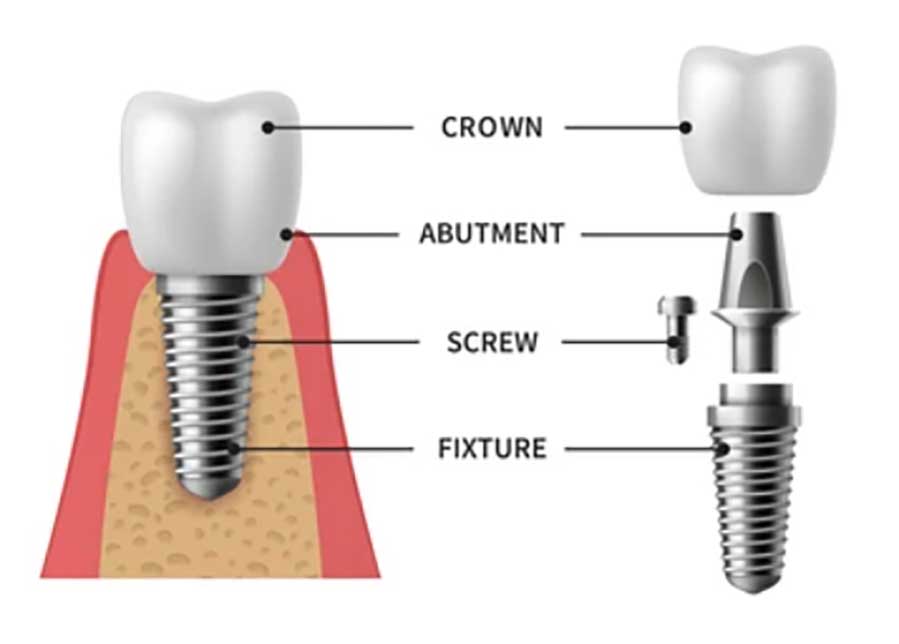Johnstown Dental Hartford OH Types of Dental Implants
Johnstown Dental Hartford OH Types of Dental Implants
Blog Article
Johnstown Dental Alexandria OH Dental Implant Procedure: What You Need to Know Before Surgery
Dental implants have emerged as a preferred alternative for individuals seeking a long-term solution to tooth loss. One important facet of understanding dental implants involves their effect on adjacent teeth. This is especially important for ensuring the health and longevity of the entire dental structure.
When a dental implant is placed, it mimics the operate of a natural tooth root. By doing so, it helps keep the integrity of the surrounding bone structure. Natural teeth rely on a balanced, interconnected system for help, and dental implants can contribute positively to that dynamic. The stability provided by the implant allows for better distribution of bite forces, which may prevent undue stress on adjacent teeth.
Orthodontics Sunbury OH Full Mouth Dental Implants
In instances the place a tooth is missing, the neighboring teeth might shift into the vacant house. This shifting can lead to misalignment and varied other issues. By putting a dental implant, the chance of this shifting is lowered, because the implant acts as a placeholder that preserves the natural alignment of surrounding teeth. This preventive effect is crucial for long-term oral health and performance.
Another important consideration is bone loss. When a tooth is misplaced, the jawbone within the space can start to deteriorate as a end result of a scarcity of stimulation. Dental implants help prevent this bone loss by providing the mandatory stimulation to the jawbone, very like a natural tooth root would. This preservation of bone not only supports the implant itself but in addition contributes to the steadiness of adjacent teeth.
The type of fabric utilized in dental implants, sometimes titanium, has a novel property of osseointegration, that means it fuses with the bone over time. This integration offers a sturdy foundation for the bogus tooth whereas ensuring that the implant doesn’t negatively have an result on surrounding structures. As the implant integrates, it creates an setting that contributes positively to the health of the adjacent teeth.

Regular dental check-ups play a vital function in monitoring the influence of dental implants on adjacent teeth. Professional assessments can help identify any issues which will arise, ensuring prompt therapy and sustaining the health of the complete dental arch. These evaluations would possibly include X-rays to examine for bone density and the overall condition of the implant and surrounding teeth.
Dental Center Galena OH Full Mouth Dental Implants
Oral hygiene practices are very important for people with dental implants. Proper brushing and flossing habits not only contribute to the longevity of the implant but also ensure that adjacent teeth stay wholesome. Food particles and plaque that accumulate across the implant may cause problems, including peri-implantitis, an inflammatory condition that can affect surrounding teeth and tissues.
The positioning of dental implants can influence the health of adjacent teeth. If an implant is positioned at an angle or not correctly aligned, it might result in increased strain on neighboring teeth. This misalignment may trigger put on and tear on adjacent enamel, doubtlessly resulting in cavities or different dental points. Therefore, the ability and expertise of the dentist performing the implant procedure are paramount in achieving a profitable outcome.
In some instances, additional procedures could additionally be necessary to prepare the encircling space for an implant. Bone grafting or sinus lifts might help create a better environment for the implant. While these procedures are aimed at enhancing the site for the implant, in addition they serve to protect the health of adjacent teeth by making a extra stable foundation.
Pediatric Dentist New Albany OH Affordable Dental Implants: A Guide

As dental expertise evolves, developments in implant strategies result in higher outcomes. Improved imaging strategies and computer-aided design enable for more precise placements that decrease risk to adjacent teeth. With these advancements, the likelihood of issues that might come up from improperly positioned implants diminishes significantly.
Post-operative care additionally performs a crucial role in making certain that adjacent teeth stay unaffected. Patients should adhere to the dentist's directions concerning food plan, oral hygiene, and follow-up visits. Neglecting these pointers may lead to problems that impact not only the implant but also the neighboring teeth.
Dentist Johnstown OH Full Mouth Dental Implants: A Comprehensive Solution
In conclusion, dental implants, when placed appropriately and cared for properly, have the potential to reinforce the health of adjacent teeth quite than detract from it. They maintain alignment, stimulate bone growth, and supply a secure basis that supports the entire dental structure. Understanding how dental implants affect adjacent teeth emphasizes their importance as a long-term tooth replacement resolution. With steady developments in technology and strategies, the combination of dental implants into restorative dentistry is changing into increasingly successful, guaranteeing wholesome and useful smiles for years to come.

- Dental implants prevent adjacent teeth from shifting into the gap created by a missing tooth, serving to to maintain correct alignment within the mouth.
- The rebuilding of the jawbone via an implant can stimulate surrounding teeth and hold them wholesome by providing needed bone density that may otherwise diminish.
- Adjacent teeth benefit from the stabilization that dental implants provide, decreasing the danger of damage and tear from misalignment during chewing.
- Implants can defend adjacent teeth by acting as a framework, which may distribute bite forces evenly across the dental arch instead of putting undue stress on neighboring teeth.
- When positioned correctly, dental implants decrease the risk of gum disease which might affect adjacent teeth by maintaining a clear and healthy gum line.
- The presence of an implant can facilitate an improved oral hygiene routine, as it eliminates the necessity for bridgework that would trap meals particles around adjacent teeth.
- Regular dental check-ups can reveal how well the implant integrates with surrounding structures, making certain ongoing health for adjacent teeth.
- Implants can prevent the natural strategy of bone resorption that happens after tooth loss, positively impacting the stability and longevity of adjacent teeth.
- The use of dental implants may reduce the need for extra invasive procedures sooner or later, providing a long-term answer that maintains the structure of the complete dental arch.
- Successful integration of an implant into the dental arch enhances total oral function, often resulting in improved confidence and oral health for adjacent teeth.undefinedHow do dental implants affect adjacent teeth?
What impact do dental implants have on the alignment of adjacent teeth?
Dental implants typically prevent the shifting of adjacent teeth, serving to to hold up correct alignment. This stability can cut back the chance of creating bite issues over time.
Can dental implants cause injury to nearby teeth?
When placed accurately by a professional skilled, dental implants should not damage adjacent teeth - Orthodontics New Albany OH. However, improper placement or insufficient planning might lead to problems
Johnstown Dental Sunbury OH Dental Implants Cost Breakdown: What You Need to Know
Do dental implants require any special care relating visit this website to adjacent teeth?
Maintaining good oral hygiene is important. Surrounding teeth must be brushed and flossed regularly, and routine dental check-ups will help be positive that each the implants and adjacent teeth stay healthy.

Will dental implants impact the health of my surrounding teeth?
Dental implants can enhance the health of surrounding teeth by distributing chew forces evenly, lowering wear and tear. Additionally, they can prevent bone loss within the jaw, which can have an effect on adjacent teeth.
Dentist Granville OH Understanding Dental Implants: A Comprehensive Guide
Are there any long-term results of dental implants on nearby teeth?
Long-term, dental implants might help protect the health of adjacent teeth by preventing shifting and potential gum issues, finally contributing to higher oral health general. - Mono Dental Implants Granville OH
Can gum problems arise round adjacent teeth after getting implants?
If proper dental care is uncared for, gum points could develop round both the implants and adjacent teeth. Following post-operative care instructions is important to reduce these risks.
Dentist Office Granville OH Full Mouth Dental Implants
How do dental implants useful link evaluate to bridges when it comes to adjacent teeth?
Dental implants are sometimes helpful as they don’t require alteration of adjacent teeth, in contrast to bridges, which necessitate reshaping of nearby teeth for support. (Dental Care Hartford OH)
Can I visit site nonetheless get cavities in adjacent teeth if I really have dental implants?
Yes, adjacent teeth can still develop cavities if not properly cared for. Dental implants themselves can not get cavities, however they require vigilant hygiene practices to guard surrounding natural teeth.
What is the success rate of dental implants in relation to surrounding teeth?
The success rate of dental implants is excessive, but it largely is decided by the quality of the procedure and ongoing care. Well-maintained implants often lead to better outcomes for adjacent teeth as well.